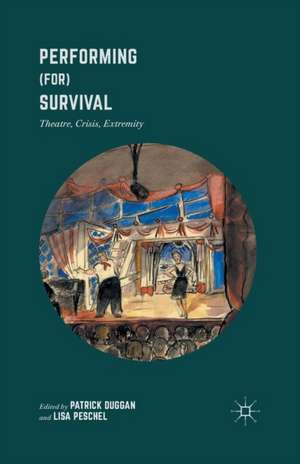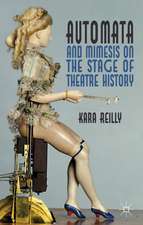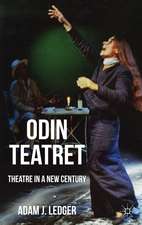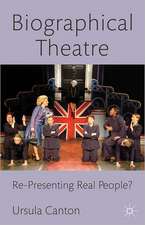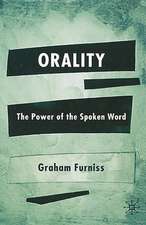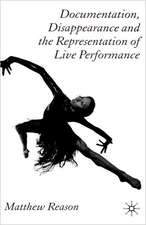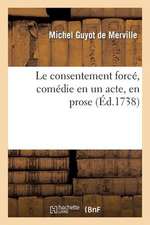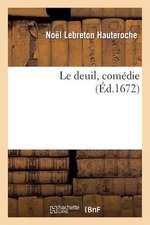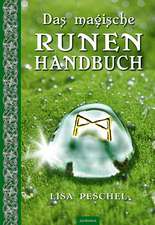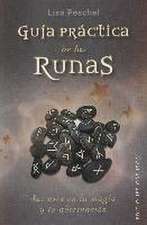Performing (for) Survival: Theatre, Crisis, Extremity
Editat de Patrick Duggan, Lisa Peschelen Limba Engleză Paperback – 9 feb 2016
| Toate formatele și edițiile | Preț | Express |
|---|---|---|
| Paperback (1) | 636.80 lei 6-8 săpt. | |
| Palgrave Macmillan UK – 9 feb 2016 | 636.80 lei 6-8 săpt. | |
| Hardback (1) | 641.71 lei 6-8 săpt. | |
| Palgrave Macmillan UK – 6 ian 2016 | 641.71 lei 6-8 săpt. |
Preț: 636.80 lei
Preț vechi: 749.19 lei
-15% Nou
Puncte Express: 955
Preț estimativ în valută:
121.88€ • 126.76$ • 102.14£
121.88€ • 126.76$ • 102.14£
Carte tipărită la comandă
Livrare economică 13-27 martie
Preluare comenzi: 021 569.72.76
Specificații
ISBN-13: 9781349568574
ISBN-10: 1349568570
Pagini: 256
Ilustrații: XI, 251 p.
Dimensiuni: 140 x 216 x 14 mm
Greutate: 0.32 kg
Ediția:1st ed. 2016
Editura: Palgrave Macmillan UK
Colecția Palgrave Macmillan
Locul publicării:London, United Kingdom
ISBN-10: 1349568570
Pagini: 256
Ilustrații: XI, 251 p.
Dimensiuni: 140 x 216 x 14 mm
Greutate: 0.32 kg
Ediția:1st ed. 2016
Editura: Palgrave Macmillan UK
Colecția Palgrave Macmillan
Locul publicării:London, United Kingdom
Cuprins
Introduction Performing (for) Survival: Frameworks and Mapping; Patrick Duggan and Lisa Peschel
PART I: SURVIVING WAR AND EXILE: NATIONAL AND ETHIC IDENTITY IN PERFORMANCE
1. Surviving (with) Theatre: A History of the ELF and EPLF Cultural Troupes in the Eritrean War of Independence; Christine Matzke
2. Theatre for Survival: Art of Creation and Protection (Kubunda); Ananda Breed and Alice Mukaka
PART II: A SPACE WHERE SOMETHING MIGHT SURVIVE: THEATRE IN CONCENTRATION CAMPS
3. The Cultural Life of the Terezín Ghetto in 1960s Survivor Testimony: Theatre, Trauma and Resilience; Lisa Peschel
4. Imagining Theatre in Auschwitz: Performance, Solidarity and Survival in the Works of Charlotte Delbo; Amanda Stuart Fisher
PART III: TACTICS AND STRATEGIES: DISSENT UNDER OPPRESSIVE REGIMES
5. Swazzles of Subversion: Puppets Under Dictatorship; Cariad Astles
6. Against Order[s]: Dictatorship, Absurdism, and the Plays of Sony Labou Tansi; Macelle Mahala
7. Surviving Censorship: El-Hakawati's Mahjoob Mahjoob and the Struggle for the Permission To Perform; Samer Al-Saber
PART IV: COMING IN FROM THE OUTSIDE: THEATRE, COMMUNITY, CRISIS
8. The Council Estate as Hood: SPID Theatre Company and grass-roots arts practice as cultural politics; Katie Beswick
9. The Art of Survival: Social Circus, Youth Regeneration and Projected Community in the North East of Scotland; Graham Jeffery, Neill Patton, Kerrie Schaefer and Tom Wakeford
PART FIVE: CRISIS AND EXTREMITY AS PERFORMANCE
10. The Paradox of Dis/appearance: Hunger Strike in Athens as a Performance of Survival; Aylwyn Walsh
11. 'Dis-ease' and the Performance of Radical Resistance in the Maze Prison; Patrick Duggan
Coda 'Je suis Charlie': The Afterlife of Inspiration; Sophie Nield
PART I: SURVIVING WAR AND EXILE: NATIONAL AND ETHIC IDENTITY IN PERFORMANCE
1. Surviving (with) Theatre: A History of the ELF and EPLF Cultural Troupes in the Eritrean War of Independence; Christine Matzke
2. Theatre for Survival: Art of Creation and Protection (Kubunda); Ananda Breed and Alice Mukaka
PART II: A SPACE WHERE SOMETHING MIGHT SURVIVE: THEATRE IN CONCENTRATION CAMPS
3. The Cultural Life of the Terezín Ghetto in 1960s Survivor Testimony: Theatre, Trauma and Resilience; Lisa Peschel
4. Imagining Theatre in Auschwitz: Performance, Solidarity and Survival in the Works of Charlotte Delbo; Amanda Stuart Fisher
PART III: TACTICS AND STRATEGIES: DISSENT UNDER OPPRESSIVE REGIMES
5. Swazzles of Subversion: Puppets Under Dictatorship; Cariad Astles
6. Against Order[s]: Dictatorship, Absurdism, and the Plays of Sony Labou Tansi; Macelle Mahala
7. Surviving Censorship: El-Hakawati's Mahjoob Mahjoob and the Struggle for the Permission To Perform; Samer Al-Saber
PART IV: COMING IN FROM THE OUTSIDE: THEATRE, COMMUNITY, CRISIS
8. The Council Estate as Hood: SPID Theatre Company and grass-roots arts practice as cultural politics; Katie Beswick
9. The Art of Survival: Social Circus, Youth Regeneration and Projected Community in the North East of Scotland; Graham Jeffery, Neill Patton, Kerrie Schaefer and Tom Wakeford
PART FIVE: CRISIS AND EXTREMITY AS PERFORMANCE
10. The Paradox of Dis/appearance: Hunger Strike in Athens as a Performance of Survival; Aylwyn Walsh
11. 'Dis-ease' and the Performance of Radical Resistance in the Maze Prison; Patrick Duggan
Coda 'Je suis Charlie': The Afterlife of Inspiration; Sophie Nield
Recenzii
“Patrick Duggan and Lisa Peschel’s Performing (for) Survival is an important contribution to the study of performance as a mechanism for survival. Its uniqueness lies in its choice to expose the internal workings of communities and politically-organised resistance movements in times of extreme crisis.” (Effie Samara, The Kelvingrove Review, Issue 16, June, 2017)
Notă biografică
Patrick Duggan is Senior Lecturer in Theatre and Performance Studies at the University of Surrey, UK. His publications include: Trauma-Tragedy: Symptoms of Contemporary Performance (2012); On Trauma, a special issue of the international journal Performance Research (2011); and Reverberations Across Small-Scale British Theatre: Politics, Aesthetics and Forms (2013).
Lisa Peschel is Lecturer in Theatre at the University of York, UK. Her publications include Performing Captivity, Performing Escape: Cabarets and Plays from the Terezín/Theresienstadt Ghetto (2014). She is a co-investigator on the £1.8 million AHRC-funded project Performing the Jewish Archive.
Lisa Peschel is Lecturer in Theatre at the University of York, UK. Her publications include Performing Captivity, Performing Escape: Cabarets and Plays from the Terezín/Theresienstadt Ghetto (2014). She is a co-investigator on the £1.8 million AHRC-funded project Performing the Jewish Archive.
Textul de pe ultima copertă
This volume gathers contributions from a range of international scholars and geopolitical contexts to explore why people organise themselves into performance communities in sites of crisis and how performance – social and aesthetic, sanctioned and underground – is employed as a mechanism for survival. The chapters treat a wide range of what can be considered 'survival', ranging from sheer physical survival, to the survival of a social group with its own unique culture and values, to the survival of the very possibility of agency and dissent. Performance as a form of political resistance and protest plays a large part in many of the essays, but performance does more than that: it enables societies in crisis to continue to define themselves. By maintaining identities that are based on their own chosen affiliations and not defined solely in opposition to their oppressors, individuals and groups prepare themselves for a post-crisis future by keeping alive their own notions of who they areand who they hope to be.
